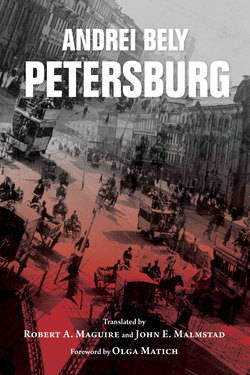Читать книгу Petersburg - Andrei Bely - Страница 23
На сайте Литреса книга снята с продажи.
SQUARES, PARALLELEPIPEDS, CUBES
ОглавлениеThere, where nothing but a foggy damp hung suspended, at first appeared the dull outline, then descended from heaven to earth the dingy, blackish gray St. Isaac’s Cathedral:† at first appeared the outline and then the full shape of the equestrian monument of Emperor Nicholas I.† At its base the shaggy hat of a Nicholas grenadier thrust out of the fog.
The carriage† was flying toward Nevsky Prospect.
Apollon Apollonovich Ableukhov was gently rocking on the satin seat cushions. He was cut off from the scum of the streets by four perpendicular walls. Thus he was isolated from people and from the red covers of the damp trashy rags on sale right there at this intersection.
Proportionality and symmetry soothed the senator’s nerves, which had been irritated both by the irregularity of his domestic life and by the futile rotation of our wheel of state.
His tastes were distinguished by their harmonious simplicity.
Most of all he loved the rectilineal prospect; this prospect reminded him of the flow of time between the two points of life.
There the houses merged cubelike into a regular, five-story row. This row differed from the line of life: for many a wearer of diamond-studded decorations, as for so many other dignitaries, the middle of life’s road had proven to be the termination of life’s journey.†
Inspiration took possession of the senator’s soul whenever the lacquered cube cut along the line of the Nevsky: there the numeration of the houses was visible. And the circulation went on. There, from there, on clear days, from far, far away, came the blinding blaze of the gold needle,† the clouds, the crimson ray of the sunset. There, from there, on foggy days—nothing, no one.
And what was there were lines: the Neva and the islands. Probably in those distant days, when out of the mossy marshes rose high roofs and masts and spires, piercing the dank greenish fog in jags—
—on his shadowy sails the Flying Dutchman† winged his way toward Petersburg from there, from the leaden expanses of the Baltic and German Seas,† in order here to erect, by delusion,† his misty lands and to give the name of islands to the wave of onrushing clouds.
Apollon Apollonovich did not like the islands: the population there was industrial and coarse. There the many-thousand human swarm shuffled in the morning to the many-chimneyed factories. The inhabitants of the islands are reckoned among the population of the Empire; the general census has been introduced among them as well.†
Apollon Apollonovich did not wish to think further. The islands must be crushed! Riveted with the iron of the enormous bridge, skewered by the arrows of the prospects. . . .
While gazing dreamily into that illimitability of mists, the statesman suddenly expanded out of the black cube of the carriage in all directions and soared above it. And he wanted the carriage to fly forward, the prospects to fly to meet him—prospect after prospect, so that the entire spherical surface of the planet should be embraced, as in serpent coils,† by blackish gray cubes of houses; so that all the earth, crushed by prospects, in its lineal cosmic flight should intersect, with its rectilineal principle, unembraceable infinity; so that the network of parallel prospects, intersected by a network of prospects, should expand into the abysses of the universe in planes of squares and cubes: one square per “solid citizen,”† so that. . . .
After the line, the figure which soothed him more than all other symmetries was the square.
At times, for hours on end, he would lapse into an unthinking contemplation of pyramids, triangles, parallelepipeds, cubes, and trapezoids.
While dwelling in the center of the black, perfect, satin-lined cube, Apollon Apollonovich revelled at length in the quadrangular walls. Apollon Apollonovich was born for solitary confinement. Only his love for the plane geometry of the state had invested him in the polyhedrality of a responsible position.
***
The wet, slippery prospect was intersected by another wet prospect at a ninety-degree right angle. At the point of intersection stood a policeman.
And exactly the same kind of houses rose up, and the same kind of gray human streams† passed by there, and the same kind of yellow-green fog hung there.
But parallel with the rushing prospect was another rushing prospect with the same row of boxes, with the same numeration, with the same clouds.
There is an infinity of rushing prospects with an infinity of rushing, intersecting shadows.† All of Petersburg is an infinity of the prospect raised to the nth degree.
Beyond Petersburg, there is nothing.
